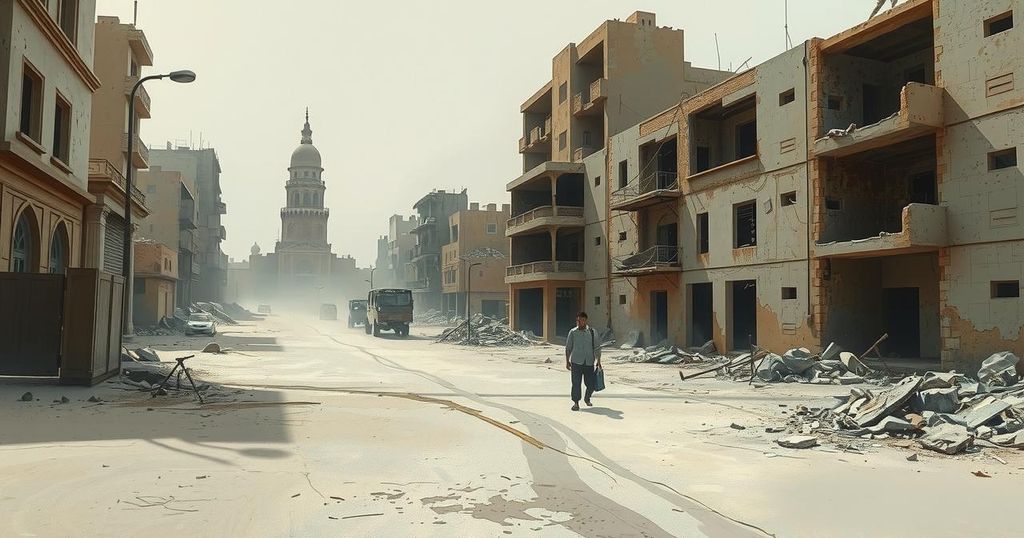Escalating Humanitarian Crisis in Sudan Amid Military Developments

The article discusses the dire humanitarian situation in Sudan, highlighting the recent military advances of the SAF in Khartoum. It emphasizes the critical role of grassroots local responders amidst escalating violence and the severe humanitarian needs of two-thirds of the population. Experts warn against overestimating military gains, suggesting ongoing conflict and worsening conditions in Darfur. The international community is urged to provide swift and coherent humanitarian aid as civilian suffering escalates.
Sudan’s turmoil escalates as its de-facto military ruler visits Khartoum after recent power recovery from rival forces. The city, once a thriving capital, is now a devastated landscape, with its residents displaced and essential infrastructure in ruins. Mathilde Vu, an aid worker, expresses deep sorrow over the hunger-related deaths, highlighting how local responders are crucial yet perilously vulnerable amidst ongoing violence.
Local humanitarian efforts in Khartoum are essential for survival, relying largely on grassroots movements, yet these efforts face existential threats, evidenced by the deaths of ten local responders amid intensified conflict. With the military asserting control over key locations, including the central bank and airport, the hope for stability remains uncertain and contingent on the reintegration of essential services.
Abiol Lual Deng, a political scientist, cautions against overestimating the military’s return as a sign of recovery. The humanitarian crisis is severe, with two-thirds of the population in dire need of assistance, a situation that a few aid flights cannot remedy. Khartoum’s collapse has severely impacted Sudan’s economic stability, sending shockwaves beyond its borders.
Dallia Abdelmoniem notes that displaced individuals are returning to hazardous environments, lacking basic services. While some civilians seek to revisit their homes, it is premature to conclude that the conflict is waning, as the Rapid Support Forces (RSF) have fortified their position in Darfur and other regions. This regional entrenchment highlights the RSF’s continued assertion of power, backed by significant cross-border networks.
The ongoing conflict raises concerns that military solutions may prevail, with the SAF potentially emboldened by recent territorial gains. The prospect of negotiations appears bleak as the SAF’s control seems to have driven the RSF further from negotiation talks, possibly reigniting prolonged warfare in regions like Darfur, which are already facing severe humanitarian needs.
Civilians trapped in conflict zones, such as Darfur, endure alarming living conditions. Many families are resorting to desperate measures for escape, underscoring the dire circumstances they face. Aid access to these areas remains critically restricted, exacerbated by intentional blockades utilized by both factions as weapons of war, complicating the aid delivery process.
While international organizations like the ICRC and MSF aim to operate neutrally, Deng emphasizes the need for sustained pressure on the global backers of the warring factions. The inconsistency in international humanitarian responses to the conflict is alarming, as urgent humanitarian needs continue to rise amid protracted debates regarding political resolutions.
Internally, the SAF faces potential fractures in unity, having previously collaborated with the RSF during operations in Darfur. The shifting power dynamics indicate a struggle for legitimate military authority as internal conflicts emerge. Furthermore, the larger geopolitical implications challenge the perception of Sudan’s war, suggesting external resource priorities may influence its evolution and resolution.
Currently, Khartoum exists in a precarious state; the SAF may possess the city, but lasting peace is elusive. Displaced civilians remain amidst destruction, aid remains severely limited, and new conflicts arise elsewhere. The call for the international community to exert pressure on warring factions echoes urgently, emphasizing that without decisive action, the underlying humanitarian crises will worsen.
The ongoing conflict in Sudan exemplifies a complex humanitarian and military situation. While recent military advances by the SAF may indicate temporary control over urban areas, the humanitarian crises are far from resolved. Local responders serve as critical lifelines for displaced civilians, yet their operations are under grave threat. The international community’s lack of coherent response compounds the needs of those suffering, urging for immediate and sustained humanitarian access and engagement to alleviate the catastrophic conditions resulting from prolonged violence. Without intervention and support, civilians will continue to bear the brunt of this prolonged conflict.
Original Source: www.arabnews.pk








